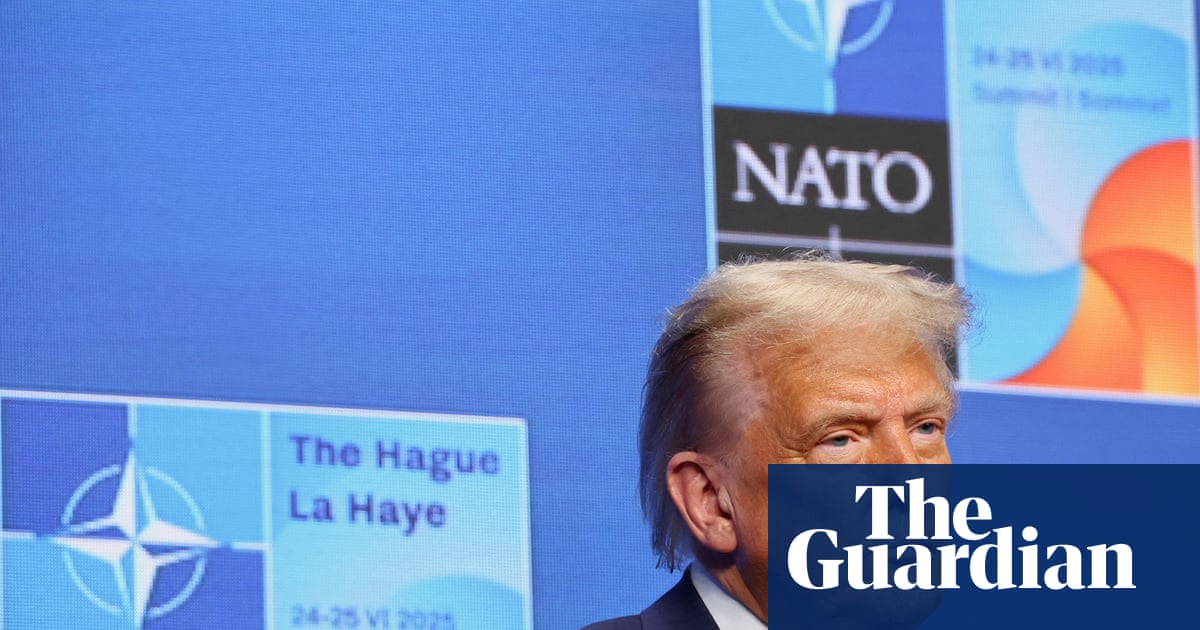There is more to Nato than article 5 of its founding charter, but the alliance depends on that commitment tomutual assistance. Enemies are deterred because an attack on one is understood as an attack on all. That is why Donald Trump’s record of ambivalence has been so destabilising.
Nato leaders, gathered for their annual summit in The Hague this week, were heartened to hear the US president say he is “with them all the way”. It was a stronger affirmation of the alliance’s purpose than the one he had given the previous day. Asked about his commitment to article 5, Mr Trump equivocated, saying: “It depends on your definition.”
That implies some category of tolerable attack on a fellow Nato member. Such ambiguity invites Russia to keep testing the threshold with escalating campaigns of sabotage and provocation on the alliance’s eastern border and at sea. But Mr Trump doesn’t seeVladimir Putinas an adversary. He speaks warmly of their telephone calls. He doesn’t recognise the Russian president’s culpability for the war in Ukraine and has shown willingness to broker a peace deal there in terms that would amount to a Kremlin victory. His administration is resisting tighter sanctions on Moscow.
By contrast, most European delegates at the summit see Moscow’s extreme hostility to the west as by far their most urgent strategic challenge. Mr Putin’s rhetoric and the state propaganda machine that promotes his agenda are ferociously bellicose. Ukraine’s experience suggests it is unwise to dismiss such language as the stuff of empty threat. The Russian economy isgeared to war. Europe needs to upgrade its defence and deterrence systems in response.
To that end, Nato members havepledged to spend5% of GDP by 2035. This is as much an investment in keeping the US engaged as a plan to supplement the shortfall if Mr Trump’s support should wane. Previous US presidents expressed frustration with what they saw as European free-riding on Pentagon security guarantees, but none threatened to quit the alliance, as Mr Trump did in 2018.
Such volatile unreliability has proved effective as a device for forcing European leaders to do something most recognised they needed to do anyway.Mark Rutte, the Nato secretary-general, pointedly praised the US president for his galvanising effect. “Dear Donald, you made this change possible,” he said.
Thefawning stylemay be required when dealing with an egotistical president, but that very necessity reveals a brittleness in the transatlantic unity on display. Mr Trump’s noncommittal caprice is not a minor character foible that can be managed with flattery. It is a function of his inability to conceive of truly reciprocal partnerships between states. He sees other Nato members as vassals and feels no durable obligation to them. He has no affection or respect for democracy and is at home in the company of despots. But he also commands the military power on which European democracies depend for their security, and will continue to depend for some time.
There is no easy resolution to this tension, between reliance on the US and the president’s inherent unreliability. But there is growing clarity among European democracies that they must expect to take ever more responsibility for their collective security. It is a difficult, expensive path, but the costs and risks of not taking it are surely greater.
Do you have an opinion on the issues raised in this article? If you would like to submit a response of up to 300 words by email to be considered for publication in ourletterssection, pleaseclick here.
